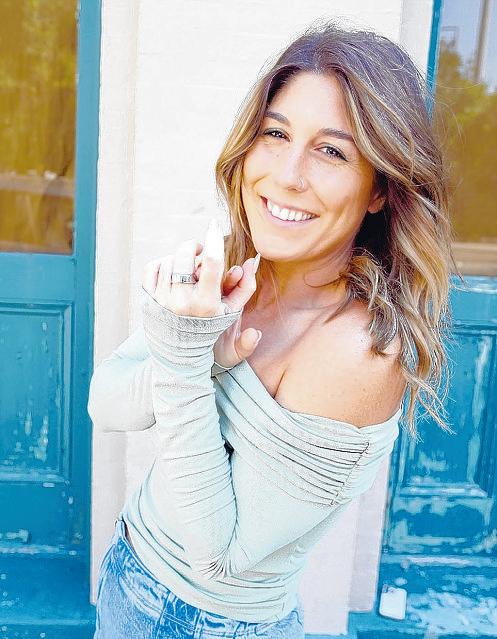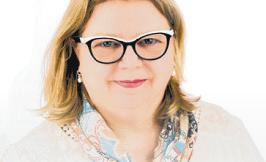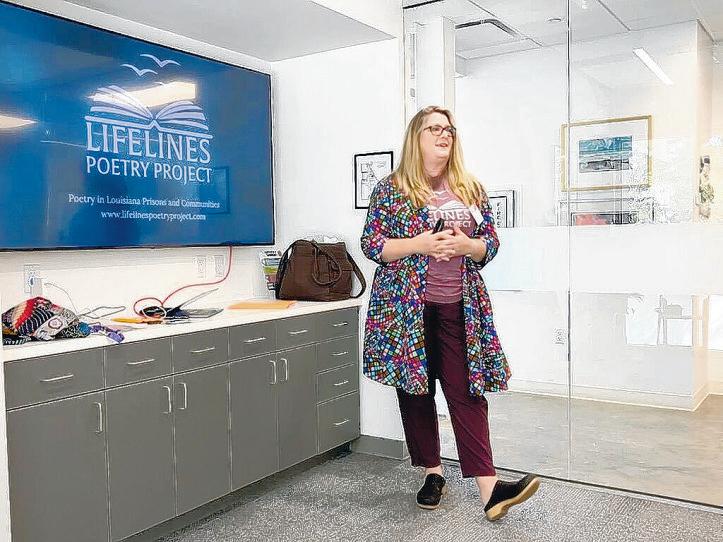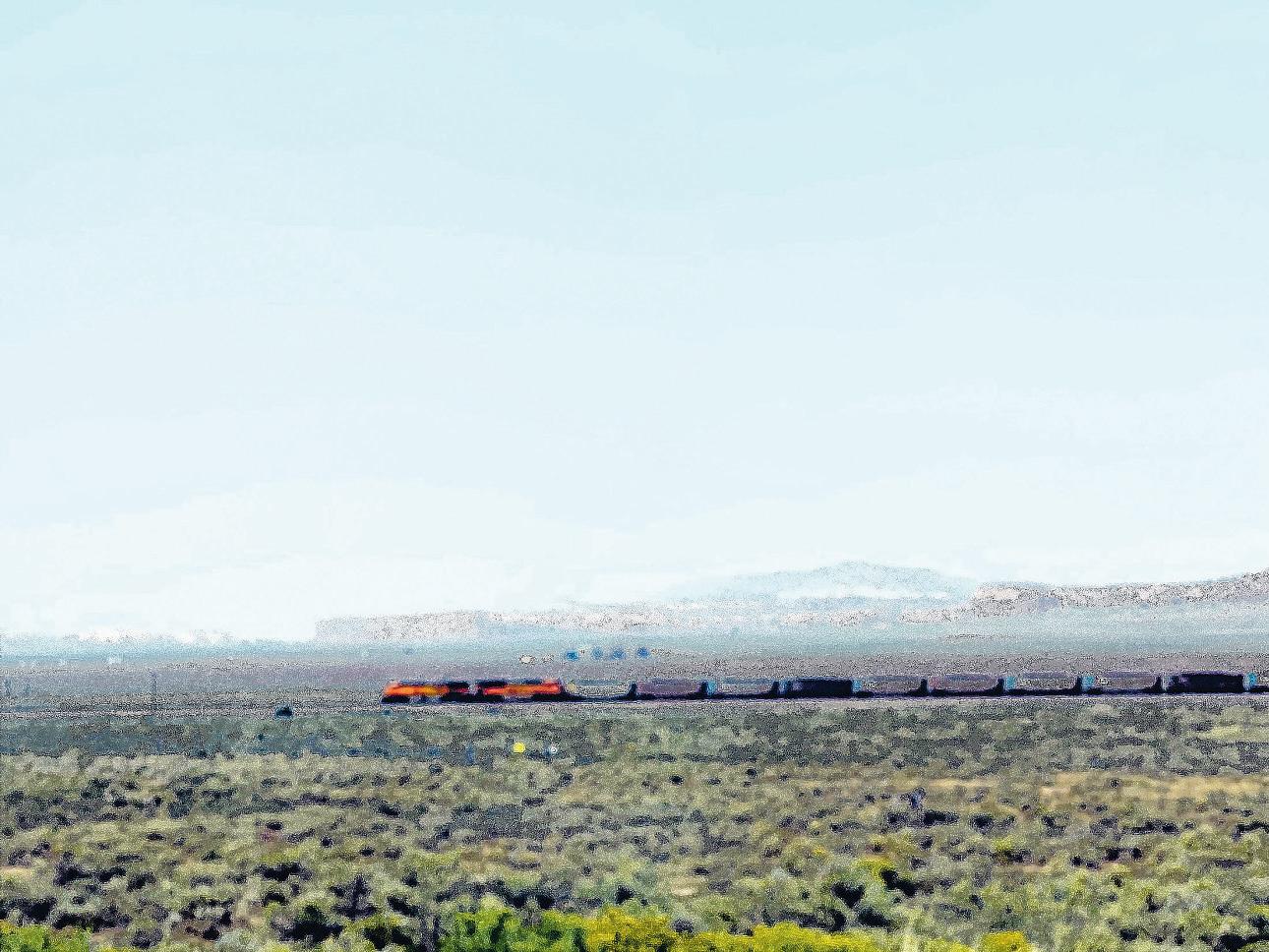If you would no longer like to receive


If you would no longer like to receive

Organization helps restaurantworkers access thehelp they need
BY SERENA PUANG Staff writer
Working in the food industry,Olivia McCoy found that her job exacerbated her mental healthstruggles
“They’re very high-stress, low-control careers,” she said of the industry “They’re also extremely physically and emotionally taxingjobs.”
To make matters worse, the cost of therapy was prohibitively expensive, especially withoutaccesstohealth benefits. Hospitality industry workers take care ofothers who are feeling down, meeting new people or celebrating thebig milestonesoftheir lives. Everybody’sgot to eat, but whotakes care of the people who takecare of everyone else?
In an industrythat McCoy said is full ofsystemic issues including substance abuse,financial insecurity and alack of health benefits, many of the people aroundher were also struggling. That’s why she founded WeHelp NOLA in early 2020. It’sa nonprofit thathelps restaurant industry workers access therapy
For WeHelp, clinicians work onthe low endofa slidingscale which allows McCoy to offer services to restaurants for the cost of approximately $10 per employee. Theorganization currently has 54 partnerrestaurantsand has provided more than 5,500 therapy sessions, free to restaurant workers.
After restaurantssignupand getonboarded, McCoy goes tothe restaurant to introduce WeHelp’s services,share her own experiences, and thenoffer
the entire restaurant staff the opportunity to usethe services for free. WeHelpalso offersfreeand discounted wellness classes such as yoga, acupunctureand reiki.
Cure Co. which includesCure,Cane & Table and Vals, signed up forWeHelp duringthe early pandemic. Alfredo Noguiera, executive chef of Cure Co., saidthey remind employees every couple of months aboutthe services
As part of WeHelp, everyrestaurant owner gets amonthly anonymized report aboutthe usage numbers and what kinds of services people are using. Some people useitfor just ashort timetoaddress something specific. Others useitinamore ongoingway Noguiera knows the services are easy touse andaccessiblebecause he’s used them himself.
“These past couple of years have been wildly challenging, and Iwas experiencing an extremely high amount of stress,” he said. “Even inside of having private health care, which Idothrough my wife’scompany,there are alot of struggles currently to get help, and (with) WeHelp, it was very seamless andvery quick.”
Noguiera said he wasabletoget an appointment within 24 hours, and WeHelp hada strongroster of therapists tochoose from.
For Mason Hereford, the owner and chef at Turkey and theWolf and itssister restaurants, thedecision to participateinWeHelp is about helping his employees. When Hereford’s restaurant group started withWeHelp in 2020, employees were noteligiblefor health insurance. They have since added healthinsurance for his managers, but for hourlyworkers or people whoopt out of insurance due to thecost,WeHelp is away to access therapy

PROVIDED PHOTO
Olivia McCoy, founder of WeHelp NOLA, worked in the food industryherself. Now, she works to help others accesstherapy.
“Participating is theright thing to do,” he said, “We’re notmaking changesinpeople’slives,but we’re offering the opportunity for people to make changesintheir ownlives and get the help theyneed.”
On the therapist’sside, WeHelp can be away foryounger therapists to gain experience andfigureout what kind of populations they’d liketosee in their practice
“I haven’treally come across anything quite like it before,” said Jane Troescher,a licensed professional counselor who workswith WeHelp. “It’svery much needed, andit’sproviding aservice to a populationthat’sprettyneglected otherwise.”
Forsomepeople,working in the food
ä See HELP, page 2G



Fornearly 17 years, my family and Ilived in one of the strangest houses around. It had quirks aplenty, but whatithad going foritwas the bulk of the back wall of the home wasglass. The expansive windows looked out over an even more expansive view of ariver In theweeks after we moved to the house in 2005, my husband fell and got aminor fracture on his knee —which led, unbeknowntous, to agiant blood clot thatbroke away fromhis leg and ended up stuck saddling his lungs. Once at the hospital, the doctor explained to me thatmyhusband’sprognosis was grim.
“I don’texpect him to make it through the night,” the doctor told me in the emergency room on thatSunday night At the time, our daughters were 8and 3.
My husband made it through the night,but during the next week, each day,one by one, his organs started shutting down. On the Friday of thatfateful week, the doctor told me thatI should bring our daughters in to see their dad. Iunderstood what thatmeant.
Miraculously,onthe next day my husband started improving. He ended up staying in the hospital for31days —and nearly 20 years later,heisstill going strong.
Fromwhere Isit now,I sometimes think about those days in the fall of 2005 whenI didn’t know whatwas going to happen or how my lifewas going to go. The hospital strictly enforced visiting hours, which meant I spent time each day at our new home. Even back then, Irecognized thatI had an unexpected peace about things.
Forone thing, Icould genuinely feel the prayers of people who loved us. The other thing thathelped me more thanmade sense was the view our home afforded of the river.Day after day,quietly sitting there and staring at the ever-running waterhelped settle my mind in ways Ican’texplain.
The panoramic view never got old. Iwould sometimes sit there and think, “Why does looking at thisfeel so good?”
Afew weeks ago, afriend sent alink to TimFerriss’ podcast interview with the English/Irish poet David Whyte. In theinterview Whytetalks alot about horizons and the value of looking at and beyond them, both literally and metaphorically.His eruditewords and perspective inspired me to do more research on horizons and why we like looking at them.
Imean, we are always looking
ä See RISHER, page 2G
LouisianaInspiredhighlightsvolunteer opportunities across south Louisiana.Ifyourorganization has specific volunteeropportunities, pleaseemail us at lainspired @theadvocate.com with details on the volunteer opportunity,organization and the contact/registration information volunteers wouldneed
Acadiana
Cite des Arts, 109 Vine St., Lafayette,isagrassroots arts incubator and multi-use arts facility that houses two performance spaces, including aprofessionally equipped, 100-seattheater,a music studio, dance studio, cafe and galleryspace. Classes and programming are offered across several different artforms:visual arts, dance, music, theater, film,storytelling and spokenword. Forvolunteer opportunities, call (337)291-1122 or visit citedesarts.org
BatonRouge
Rescue Alliance, 12484 La. 44, Gonzales, is anonprofit organization committedtothe well-beingofanimalsin GreaterBaton Rougeand surrounding areas by providing, facilitating and promoting spay/neuter,adopting or facilitating theadoption of homeless animals,teaching the community responsible companion animal ownershipand thehumane treatment of animals,and at alltimes promoting the practice of spay/neuter.With the help of volunteers,RescueAlliance offers anumberofservices and programs that striveto promote animal welfare. Formore volunteer opportunities, visit animalrecovery.org
NewOrleans
Farming NewOrleans, 5648 Hawthorne Place, NewOrleans, is anonprofit organization whose mission is to promote the cultivation of gardens, groves and livestock as vehicles foreducation, building community, feeding thehungry and promoting entrepreneurship in NewOrleans. For volunteer opportunities, visit farmingneworleans.org
BY SERENA PUANG Staff writer
As Louisiana Poet Laureate, Alison Pelegrin, writer in residence at Southeastern Louisiana University, is Louisiana’s acting literary ambassador She was named for her two-year tenure in 2023, and soon after, people from the Louisiana Endowment for the Humanities kept asking her what her project was going to be.
“I was like, ‘I don’t know I don’t have any ideas,’” she said. Everything she could think of felt vague and not true to herself, but then she was invited to visit the Louisiana State Penitentiary at Angola, as part of a literary conference, and the visit changed everything.
“It became immediately clear to me that a one-time visit wasn’t enough,” she said. The visit sparked an idea to make poetry workshops a more regular thing. However she was faced with challenges: namely setting up the visits across Louisiana. “I mean, it’s not a matter of just calling and offering your services That was quite a learning curve.”
After several months of persistence and a grant from The Foundation for Louisiana and funding from the Mellon Foundation, Pelegrin established what is now the Lifelines Poetry Project, a program of outreach and workshops in Louisiana prisons and community centers. As of the end of 2024, she’s visited over 200 incarcerated poets at nine different institutions.
The poetry outreach is meant to facilitate community and a “lifeline” to the outside world for incarcerated people. Poetry might seem esoteric to some, but to Pelegrin, there’s nothing more important.
“Poetry is essential, it can be like a prayer,” she said.
“It’s a place to have freedom inside of your mind.”
She will present and celebrate the results of this work at the 10th annual New Orleans Poetry Festival which will be hosted on April 7-13, 2025. The following interview is edited for clarity and length

Tell me about the first time you visited Angola
Before I got there, I was really worried that I wouldn’t possibly have anything to offer this group.
When you consider what these people are faced with life sentences or extremely long sentences in a world that is almost literally colorless at times I was afraid that I didn’t have anything to offer, and I didn’t want it to feel like a waste. I was allowed to bring in one book, and the book I brought in was a book of poetry exercises On any blank spaces, I wrote down poems so that we could talk about them. It just went great It was a wonderful, warm group of people. They had somehow procured carrot cake, which we had at intermission, and they had written down questions to ask about poetry We wrote a little bit, we talked a little bit, and at every turn, the group went right to the meat of any poem or idea that we were talking about.
What were your hopes for this project once you got the ball rolling?
When I first started doing this, I was thinking that this would force people to encounter and consider the humanity of the incarcerated. I still think that, but my ideas have changed, too.
I think that (this project) forces people outside of the carceral system to examine their own humanity, to look at what we have created in this system of prisons, which capture people as children
sometimes and just keeps them there forever Our state is the incarceration capital of the world. That’s not a point of pride as far as I’m concerned. We need to see what we’ve made. Life in prison looks like people dying in hospice alone in a room with cinderblock walls and a depressing painting on the wall.
What poems/poets do you read in the workshops?
When I was with the Angola group that first time, a lot of the poems I had copied in that book were just haiku, because I didn’t have a lot of space and that’s a nonintimidating poem it’s only three lines.
(Since then) I listen to what people say, and what they respond to, I’ll do more of I brought in sections of C.D Wright’s book, “One Big Self,” because she wrote that after visiting three Louisiana prisons with the photographer Deborah Luster to photograph inmates. One of the things she uses to hold that book together is a series called “Count: count this, count that.” Because in prison your whole day is punctuated by the count. That’s when classes end, that’s when your day begins.
A poem that was a big hit yesterday is “Ode to Gold Teeth” by Danez Smith. They were just cracking up laughing. We were talking about how it’s the duty of the poet to praise things or to write about things that seem ordinary or maybe not even worthy of praise and

working in a new city with a limited support system all at the same time.


how the gold teeth fit into that.
What happens to the poems people write?
I bring note cards with me and hand those out. If they (the writers who are incarcerated) start writing and want to share what they’ve written for me to bring with me, they can copy it (on) a notecard. Not everyone does, maybe not even 50% of the people do. It’s their choice.
I have those poems, and I sometimes put snippets of them on the blog with the permission of the authors
One thing I’m going to be doing is putting together a poster that has some of this work as a cento, a poetic form where every line in the poem comes from another text. In other words, I might mine these poems, take from them and make something kind of collective.
How do you think about the Lifelines Poetry Project interactions and what do you hope is the long-term effect of your time together?
In my experience as a young poet, it did not take much for a spark for me, you know? Any time you see someone or you have a visi-
tor, you’re out of your norm, it can be really influential. I think that can last a long time. I’d love for the writers to be able to have groups where they’re providing feedback and sharing their work in the long term. I’d love to figure out a way to establish a group of writers that were regularly visiting prisons across the state to support creative writing, not just poetry, but all of it.
Email Serena Puang at Serena.Puang@ theadvocate.com
industry is just another job. For Tricia Cominsky, a server at Wakin’ Bakin’, being entrusted to serve others is an honor
”Food is so nourishing and human connection is so nourishing,” she said. “If you get to experience both of those in a positive manner in the same setting, it’s really powerful. It can change people’s lives.”
Some people save up for an entire year just to treat their loved ones on a special occasion, she said.
“That’s not something to shy away from,” Cominsky said. “We should embrace that as a culture, that’s a huge honor.”
Cominsky sees every table as an opportunity to make a connection or brighten someone’s day But behind the scenes, she’s had a lot going on. She moved to New Orleans in the fall of 2023, shortly after her mother passed away She was dealing with grief, a challenging relationship and
Those who can thrive in the service industry, Cominsky said, are people who can read others well and anticipate their needs before they happen. The most successful servers “shapeshift” to adapt to the energy and needs of every table One table could be celebrating a birthday Another table could be on a first date Yet another could be coming from a funeral. If you’re not careful, she said, you can lose yourself in the emotionally exhausting process.
For Cominsky, having a safe space for an hour every other week is invaluable.
“Who’s listening to me?” she said. “I just cared for 400, 800, 1,000 people. I made 2,000 eggs this weekend. Who’s going to listen to me talk about what I was going through while I was doing that? How was I processing the grief of something while I was at work? WeHelp does that.”
Email Serena puang at serena. puang@theadvocate.com

at something. Why are some views of nature so much more pleasing than others?
Sensory Trust, a U.K.-based charity, published an article on horizon-gazing, saying, “Our ancestors would have gazed at the horizon and widened their peripheral vision as much as possible in order to scan the landscape for threats. This act produces a calming effect, safe in the knowledge that no immediate action needs to be taken.”
Sensory Trust then asks the question: How does horizongazing fit in with the modern world and can it really have an impact on our emotional health
and wellbeing? Dr Andrew Huberman‘s studies provide some science to explain the positive effects of looking at a broad horizon, saying that when we look at something stressful our field of vision narrows to keep that one thing is in sharp focus and the rest blurrier Huberman is a professor of neuroscience and ophthalmology at Stanford. His research suggests that by expanding one’s visual field, the body is able to switch off the stress response a wider panorama or view reduces stress. (He has lots of videos that explain ways to reduce stress with visual and breathing techniques.) All these years later, I better understand why when I was in the most stressful period of my
life, I craved sitting and looking out the window at the broad view of a river flowing. I don’t live in the same house any more. The view out my back window is not impressive. Even still, I’m a believer in finding ways to regularly broaden my horizon both literally and figuratively I make a point to find the horizon and sit and stare almost daily, near and far whether it’s out my window in my office, of the Mississippi River, while driving
BY KAREN SWALLOW PRIOR Contributing writer
The November issue of The Atlantic has a feature story that has generated a lot of discussion:
“The Elite College Students Who Can’t Read Books.”
The article describes how these top-tier students, while possessing basic literacy struggle to read a lot of books (or even one whole book) because they lack the skills and the practice to sustain the attention and comprehension necessary to read long, rich literary texts.
Such a development among young people has obvious implications within the context of higher education, not to mention the worlds of work and everyday life these students will later inhabit. But the rise of a generation that can’t or doesn’t read books matters for the church, too. After all, if people can’t or don’t read books, how will they read the Bible? Will they read the Bible?
To be sure, hand-wringing think pieces on the decline of reading constitute a genre unto itself. It’s been tempting for a long time for educators, cultural critics and book lovers to claim the sky is falling when it comes to reading. Annual surveys almost always show a decline in the number of books read by American adults over the previous year and over the decades.
In some ways, this finding is hardly surprising. So many more options are available for leisure time. Plenty of education reporting shows children are reading fewer books in school and reading less well overall. And so much more reading material is available and in various delivery formats to fill the time one does spend reading. Hours spent skimming texts and social media on a phone not only don’t exercise the regions of the brain exercised during deep reading they atro-
phy those areas. The Atlantic article brings a new development to the fore in describing how college students at “elite” institutions come to college lacking both experience in reading whole books and the expectation of themselves that they should do so in a college course. “It’s not that they don’t want to do the reading,” the story explains. “It’s that they don’t know how.”
There can be no doubt that we are seeing the slow unfolding of the post-literate society predicted decades ago by communications theorist Marshall McLuhan. Christians ought to recall that the literate society which has characterized modern life for the past several centuries was largely brought by the church. The Protestant Reformation’s emphasis on the need for all believers to read the Bible for themselves coincided with the technology of the printing press, which made mass production of the Bible (and other texts) possible. The desire of the Reformers for everyone to have access to and ability to read Scripture for themselves led to the ability to read other texts, too. Ability led to desire which led to demand which cultivated supply of Bibles, books, pamphlets, poetry, treatises, manuals, novels and textbooks.
The Reformers, Puritans, evangelicals and enslaved persons who had been converted to Christianity were reading people who cultivated a literate society because they knew that the ability to read is liberating.
Eighteenth- and 19th-century evangelists and activists people such as Robert Raikes, Sarah Trimmer and Hannah More opened Sunday schools that prioritized teaching children to read In the 21st century, most people like those elite college students described by The Atlantic have the basic skills to read but lack the expe-

rience and practice required to read deeply and well Once again, Christians can lead the way One way to do so is the most natural: in church. Worship services and sermons designed to lead congregants through close reading of long texts from the Bible can actually teach reading. People have easy access today to flashing lights, stimulating videos and loud music. What people need now that churches can offer more than any other place is deep reading practice and experience. This can be done not only in worship services but also through book studies that lead readers through quality, literary texts (something I have done in my
own church context).
To be sure, digital technology, like the printing press, brings its own gifts to the world. But digital media’s preference for the visual, the quick and the shallow should only complement, not replace, the deep, immersive, slow experience of reading. Reading good books well is a formative experience. It forms our character and develops virtues (such as patience, diligence, compassion, reflectiveness, stillness and magnanimity) that shape our hearts and souls in no lesser ways than physical exercise strengthens the body Reading well is important for everyone and should be important to


“When Istarted A1 Nola Notary, it wasclear that abetterhandleonthe financial aspects of running abusiness wasneeded That’s whyIjoined theShell LiveWireprogram. Since then, A1 Nola Notaryhas seenabusiness evolution. Thecompanyhas grownand I’ve gained valuable insights and skills to effectivelymanage andscale operations.”
TATIANAALANIZ
A1 NOLA NOTARY
everyone, not only for students at “elite” colleges. But for religious people especially, the loss of our collective desire and aptitude to read good books well is lamentable. Reading literary art is an expression of our being made in the image of a creator God. Cultivating the desire to enjoy good creations and being able to take delight in them also reflects the image of God in us.
Reading is an area in which the church historically has led the culture and is called to do so again. Christians have often been called a “people of the book.” The time is ripe for us to model that description and help others do likewise.

For TatianaAlaniz,small business nevermeant thinkingsmall.She knew her notary business couldfill gaps in under servedcommunities. Shealso knew shecould makeareal difference, if onlyshe could professionalize her servicesand leverage her company’sbilingual support. After10years experience as aparalegal andmanager, she decidedtotakeabold leap. Theresult: A1 Nola Notary, LLC, amother-daughterowned business that providesarange of notarial services, especiallytoLatino communities.
ThroughShell LiveWire,Tatiana gained valuable skills that optimized daily operations.She hassince been able to efficiently manage growth,improve operations,and setthe stagefor A1 Nola Notary to expand in theyears ahead. Moreimportantly,her business hasbecome avital neighborhood partner, dedicated to meeting theneeds of itsclientswithintegrityand efficiency.
“Shell LiveWireisafreebusiness acceleratorprogram to help entrepreneursand small business ownerssustain and grow,” explains Becky Cooper,USSocial Investment Advisor. “Shell LiveWire participantsbenefit from an eight-week intensivetraining program, networking opportunities, and a range of resources. TheAccelerator’s objectiveistoempower businesses from various fields andwelcomesapplicantsfromdiverse sectors.”
Applicants forShell LiveWire LouisianaAccelerator Programare acceptedfrom Ascension, Assumption, East BatonRouge,WestBaton Rouge,Iberville,Jefferson, Lafourche, Livingston,St. Charles, St.James, St.John theBaptist, St.Mary, and Terrebonne Parishes. Diverse micro, entrepreneurs,and small business owners (e.g., women-owned,minority-owned,veteran-owned,LGBTQ+, etc.)are strongly encouraged to apply
Applications forthe 2025Shell LiveWireLouisiana Accelerator Programwill be acceptedthrough January 31, 2025. Application formscan be found on: www.shell.us/livewire
shell.us/louisiana |#PoweringProgress

We use theincrediblepowerofour audience to executeadvertisingand marketing campaigns with aclear mindset –results. If we don’t achieve results, we don’t keep our clients.

You’relucky to have onegreat brand. Thankstoacommitment to Louisiana anda commitment to local, we have several.
Andgreat brands bringgreat readers
163MILLION TOT AL USERS
810,000 PR INT READERS
We’recommittedtolong-term success when manyofour peersare retreating. It takesinnovation and initiativeacross all ourplatforms andall our teams We’reherefor apurpose. Forour readers. Forour clients. ForLouisiana